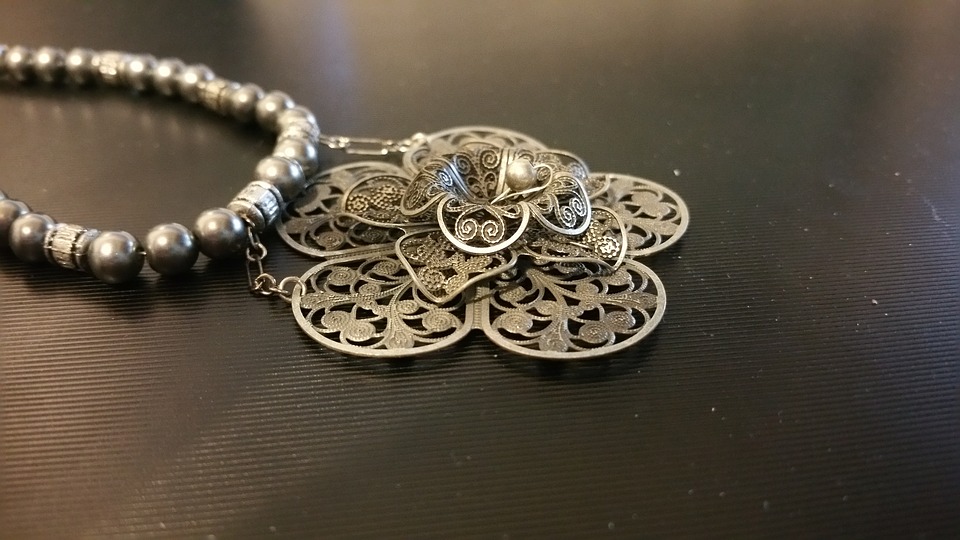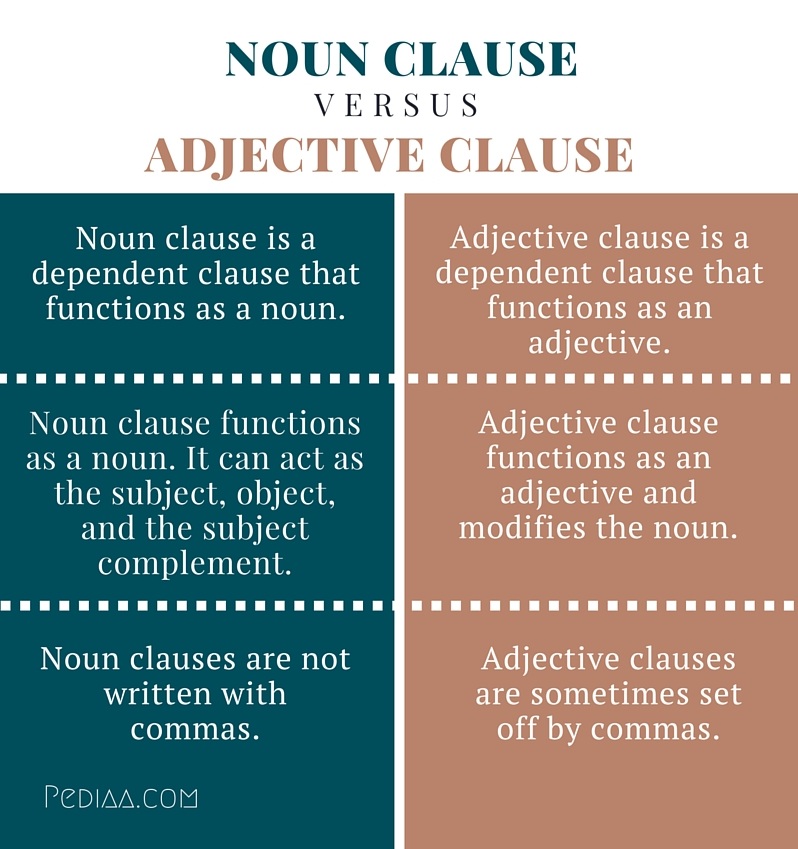Main Difference – Noun Clause vs Adjective Clause
A clause is a group of words that contains a subject and a predicate. There are two main types of clauses in grammar. They are independent clauses and dependent clauses. Independent clauses are the clauses that express a complete thought. Dependent clauses (subordinate clauses) are the clauses that cannot express a complete idea. Dependent clauses can be mainly divided into three categories based on their functions: noun clauses, adjective clauses, and adverbial clauses. As their names suggest, these clauses act as nouns, adjectives, and adverbs, respectively. In this article, we are focusing on the difference between noun clause and adjective clause. The main difference between noun clause and the adjective clause is that noun clause functions as a noun whereas adjective clause functions as an adjective.分句是一组包含主语和谓语的词。语法中主要有两种类型的子句。它们是独立分句和从属分句。独立分句是表达一个完整思想的分句。从属句(subordinate clause)是不能表达完整思想的句子。从属句根据其功能主要可分为三类:名词性分句、形容词性分句(定语从句)和副词性分句(状语从句)。顾名思义,这些分句分别充当名词、形容词和副词。在这篇文章中,我们主要讨论名词性分句和形容词性分句的区别。名词性子句(分句)和形容词性子句(分句)的主要区别是,名词性子句作为名词发挥作用,而形容词性子句则作为形容词发挥作用。
What is Noun Clause
A noun clause can be defined as a dependent clause that acts as a noun. A noun clause cannot stand alone as a sentence because it cannot express a complete thought. Noun clauses generally begin with words such as how, that, what, whatever, when, where, whether, which, whichever, who, whoever, whom, whomever, and why. Like a noun, a noun clause can function as the subject, object or the complement.名词性分句可以被定义为充当名词的从句。名词分句不能单独作为一个句子,因为它不能表达一个完整的思想。名词性短语一般以how、that、what、whatever、when、where、whether、whichever、who、who、whoever和why等词开头。 与名词一样,名词性分句可以作为主语、宾语或补语。
Noun Clause as the subject名词性分句可以作为主语:
What my friend did was unbelievable.
What Carol said shocked all of us.
Noun Clause as the object名词性分句可以作为宾语:
DO you know how much this will cost?
I didn’t know that he could sing so well.
Noun Clause as the object of a preposition名词性分句可以作为介词的宾语:
We are not responsible for what they did.
You can give this to whoever you like.

You can pick whichever you like.
Noun Clause as the subject complement名词性分句可以作为主语补足语(A subject complement is a word or phrase that follows a linking verb and identifies or describes the subject.主语补语是跟在系动词后面的一个词或短语,用于识别或描述主语):
Whichever option you choose is fine with us.
Your problem is that you don’t have faith in God.
What is Adjective Clause
An adjective clause can be defined as a dependent clause that acts as an adjective. Since adjective clauses play the role of adjectives, they can modify or describe a noun or pronoun. An adjective clause commences with a relative pronoun (that, which, who, whose, whom) or a relative adverb (when, where, or why). Since they begin with relative pronouns, adjective clauses are also known as relative clauses.形容词性分句可以被定义为充当形容词的从句。由于形容词从句起着形容词的作用,它们可以修饰或描述名词或代词。形容词句以关系代词(that、which、who、who、who)或关系副词(when、where或why)开始。因为它们以相对代词开头,所以形容词性分句也被称为关系从句。
It is important to note that adjective clauses that add non-essential information to the noun are set off from the main clause by commas whereas adjective clauses that add essential information are not. You can observe this rule better by looking at the examples below.需要注意的是,为名词增加非必要信息的形容词从句要用逗号隔开,而增加必要信息的形容词从句则不用。通过观察下面的例子,你可以更好地观察这一规则。
This apple tree, which was planted by my great grandmother, is 100 years old.
I kicked the cat that scratched you.
Ice-cream, which many of us adore, has no nutritional value.
My grandfather can remember the time when there were no televisions.
The old man who lives there went on holiday.

This necklace, which was given to me by my husband, is an heirloom传家宝.
Difference Between Noun Clause and Adjective Clause名词性从句和形容词性从句的区别
Definition
Noun clause is a dependent clause that functions as a noun.
Adjective clause is a dependent clause that functions as an adjective.
定义
名词性从句是作为名词使用的从属句。
形容词从句是指作为形容词使用的从属句。
Function
Noun clause functions as a noun. It can act as the subject, object, and the subject complement.
Adjective clause functions as an adjective and modifies the noun.
功能
名词性子句的功能是名词。它可以充当主语、宾语和主补语。
形容词句的功能是形容词,修饰名词。
Punctuation
Noun clauses are not written with commas.
Adjective clauses are sometimes set off by commas.
标点符号
名词从句不使用逗号。
形容词分句有时用逗号隔开。

